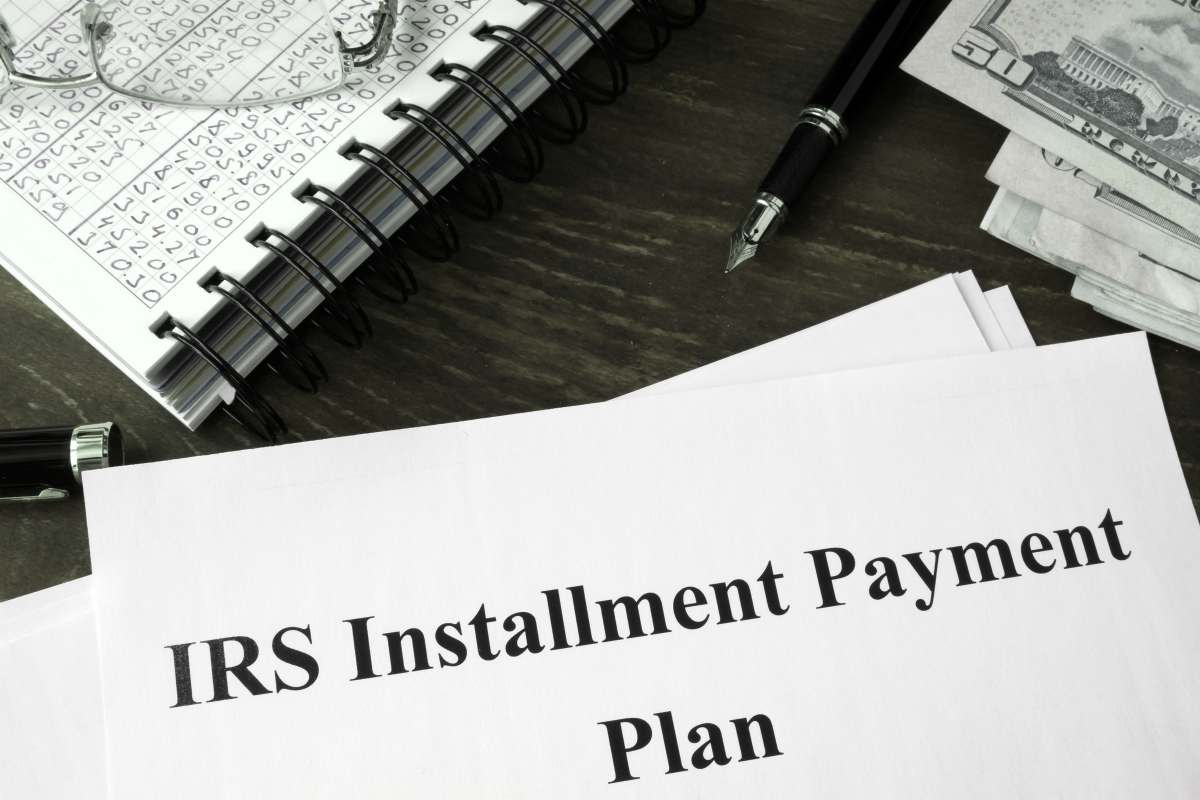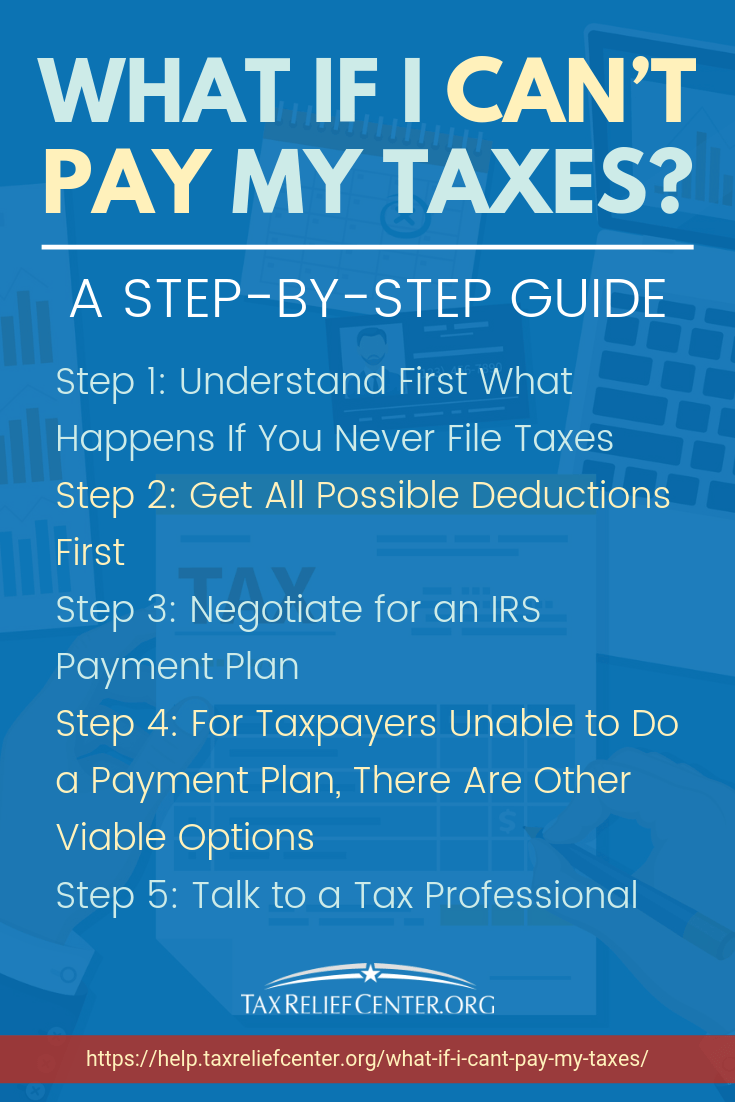The question “what if I can’t pay my taxes” is a tough one to answer but is very possible to resolve with a little bit of help.
RELATED: How Do IRS Payment Plans Work? | FAQs
What If I Can’t Pay My Taxes? | A Step-by-Step Guide
Step 1: Understand First What Happens If You Never File Taxes
Not filing for taxes can lead to more complex cases like tax evasion, as per Find Law. If a taxpayer did not file taxes on purpose, they can get convicted and fined.
Usually, the IRS sends their own tax report first to the taxpayer.
This report will have a considerably higher tax amount compared to previous tax filings. The IRS can refer to the previous tax file and then not apply all the deductions available.
Rather than go through an arduous court proceeding, the IRS actually prefers getting a partial amount rather than nothing at all.
If the delay is due to something a taxpayer can avoid, the IRS imposes tax penalties. Some common examples include the failure to file penalty, tax penalty for underpayment, and even a monthly interest rate on unpaid taxes on top of said penalties.
Tip: Filing taxes even if you cannot pay your taxes in full is still the best practice as the failure to file penalty is 10 times higher than the failure to pay penalty.
In a nutshell, there are three things a taxpayer needs to better understand the tax process.
First, the IRS wants to work with you. Consider them as allies, not enemies.
Second, filing taxes is not as hard as most people say it is. However, special circumstances may need the assistance of a tax advocate, especially if financial hardship is involved.
Lastly, there are several effective strategies most taxpayers do not know.
Step 2: Get All Possible Deductions First
Avoid filing late and sending inaccurate tax payments by going through all the possible deductions.
For example, reading about the common tax deductions can help taxpayers see if they forgot to add certain deductions. Going through this list can help taxpayers spot other ways of lowering the tax brackets.
Charitable deductions can lead to a lower AGI. The current limit for 2019 is at $15,000.
Some contributions to an IRA can also lead to a lower tax income bracket so talking with a financial advisor may help with the adjustments.
Business expenses for self-employed individuals and business owners can also lower the tax income bracket substantially. For example, a home office can give you a substantial deduction and a certain percentage of the home utility bills also counts as a business expense.
Owning assets usually leads to higher income taxes, but there are ways to offset these kinds of expenses as well. For landowners, rental income can still receive deductions by amortizing the mortgage as well as insurance payments and plumbing expenses.
Lastly, transportation expenses, if related to business operations, can lower the tax bill, with the IRS considering mileage rates as part of business operations.
Taxpayers should always look for ways to lower their AGI. Usually, these come from deductions or categorizing expenses and income differently.
AGI Definition: AGI or Adjusted Gross Income is the amount left of the gross income after tax deductions. Basically, a low AGI means a lower tax bracket.
Step 3: Negotiate for an IRS Payment Plan

The IRS gets thousands of applications for payment plans, so the earlier a taxpayer applies for one, the better the chances of receiving a grant.
Rather than wait for the deadline, applying for a payment plan months earlier gives the IRS enough time to review and consider the application.
A more comprehensive discussion about payment plan options, with their fees and structure, can give taxpayers a better chance at making wiser decisions, especially those who cannot pay the whole tax in one go.
RELATED: How To Check Your IRS Payment Plan Balance
Step 4: For Taxpayers Unable to Do a Payment Plan, Here Are Other Viable Options
Option 1: If a Lump Sum Is Too Big, Ask for an Offer in Compromise
An OIC (Offer in Compromise) can substantially lower the taxes for qualified taxpayers.
Taxpayers fill out Form 656 and apply for an OIC grant.
Tip: To further increase chances and show good faith, taxpayers can make a downpayment (usually 20%) of the total amount offered in the OIC and then pay off the remaining 80% in the time frame specified.
Another important thing to remember is the limitations of the law.
The IRS has two years maximum to decide whether or not to grant an OIC.
To see if an investor has a chance of acceptance in the OIC program, the IRS OIC pre-qualifier Quiz can help.
Option 2: Ask for an Extension If Necessary
A tax extension can provide taxpayers much-needed room to breathe when it comes to their finances.
Usually, a tax extension can last for about 6 months. Some can qualify for longer periods, like active military personnel in war zones.
Of course, this tax extension applies only if a taxpayer has a good enough reason. If there are none, the IRS will investigate and apply penalties.
Option 3: In Cases Where a Taxpayer Can’t Pay IRS Installment Agreement, Apply for a CNC Status
A CNC status suspends the collection letters as well as the fines and penalties for a taxpayer.
Usually, the CNC only applies to people who are delinquent for 1 or 2 years in tax payments and those that have financial hardships. The CNC status applies to both paying and filing of taxes.
Financial hardship in this context does not only mean the actual current difficulty. A taxpayer can state that financial hardship may happen when they file and pay for taxes.
Taxpayers need two forms to apply for a CNC status. The first is IRS Form 433-A followed by IRS Form 433-F.
The first form focuses on informing the IRS that the taxpayer is currently in financial hardship or will go through one if the current taxes are imposed. Some taxpayers are familiar with this form as they also use this for an Offer in Compromise.
The second form deals largely with applying for an installment plan. This means the taxpayer is under financial hardship but is able to pay taxes, albeit at a lower rate.
Step 5: Talk to a Tax Professional

Each person has different circumstances. General tips and strategies may not apply to a specific problem.
A taxpayer can get the services of a tax advocate to perform all the necessary actions for greater peace of mind.
Going for a free consultation can give taxpayers a greater understanding of the situation that will allow them to make well-informed decisions.
The inability to pay taxes is a difficult problem to solve but is never an impossible one. Rather than waste time and energy panicking, taxpayers are better off asking for help and being well-informed to make wiser decisions to resolve their tax crises.
Do you have other useful tips for taxes? Let us discuss in the comments section below.
If you owe back taxes, visit taxreliefcenter.org for more information on tax relief options.
Up Next:
- 81 Ways to Save Taxes All Year Round
- The Master List of All Types of Tax Deductions
- 5 Standard Tax Deductions for Retirees and Seniors


